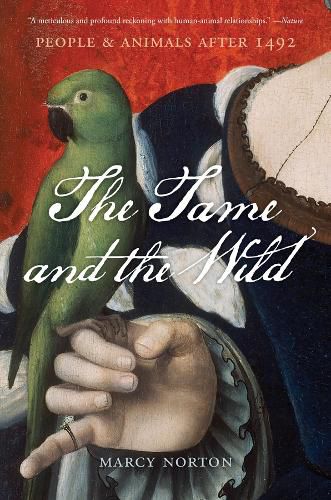Readings Newsletter
Become a Readings Member to make your shopping experience even easier.
Sign in or sign up for free!
You’re not far away from qualifying for FREE standard shipping within Australia
You’ve qualified for FREE standard shipping within Australia
The cart is loading…






A dramatic new interpretation of the encounter between Europe and the Americas reveals the crucial role of animals in the shaping of the modern world.
When the first European colonizers arrived in the Americas, they were utterly dependent on the dogs and horses who assisted them in military campaigns as well as the livestock who provided them with food and labor. These settlers were convinced that their use of domesticated animals made them superior to Indigenous peoples, who did not practice livestock agriculture. In The Tame and the Wild, however, Marcy Norton shows that Indigenous ways of relating to animals were as sophisticated-and consequential-as those developed by other peoples across the Atlantic.
Like Europeans, Indigenous people throughout the Caribbean, Amazonia, and Mexico hunted wild animals. Yet, instead of raising domesticated livestock, Indigenous communities engaged in familiarization: they captured and tamed wild animals-from monkeys and parrots to sloths and manatees-whom they made into kin. Familiarization not only affected Indigenous responses to the invasions but also shaped European culture by influencing natural sciences and the emergence of the modern pet.
A sweeping history of human-animal relationships in the centuries after 1492, The Tame and the Wild explains the origins of a contemporary paradox: the fact that humans continue to create enormous suffering for some animals while enjoying companionship with others.
$9.00 standard shipping within Australia
FREE standard shipping within Australia for orders over $100.00
Express & International shipping calculated at checkout
Stock availability can be subject to change without notice. We recommend calling the shop or contacting our online team to check availability of low stock items. Please see our Shopping Online page for more details.
A dramatic new interpretation of the encounter between Europe and the Americas reveals the crucial role of animals in the shaping of the modern world.
When the first European colonizers arrived in the Americas, they were utterly dependent on the dogs and horses who assisted them in military campaigns as well as the livestock who provided them with food and labor. These settlers were convinced that their use of domesticated animals made them superior to Indigenous peoples, who did not practice livestock agriculture. In The Tame and the Wild, however, Marcy Norton shows that Indigenous ways of relating to animals were as sophisticated-and consequential-as those developed by other peoples across the Atlantic.
Like Europeans, Indigenous people throughout the Caribbean, Amazonia, and Mexico hunted wild animals. Yet, instead of raising domesticated livestock, Indigenous communities engaged in familiarization: they captured and tamed wild animals-from monkeys and parrots to sloths and manatees-whom they made into kin. Familiarization not only affected Indigenous responses to the invasions but also shaped European culture by influencing natural sciences and the emergence of the modern pet.
A sweeping history of human-animal relationships in the centuries after 1492, The Tame and the Wild explains the origins of a contemporary paradox: the fact that humans continue to create enormous suffering for some animals while enjoying companionship with others.